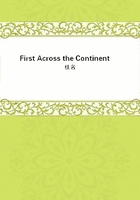
第17章
The wars of some of the Indian tribes gave Lewis and Clark much trouble and uneasiness. The Sioux were at war with the Minnetarees (Gros Ventres, or Big Bellies); and the Assiniboins, who lived further to the north, continually harassed the Sioux and the Mandans, treating these as the latter did the Rickarees. The white chiefs had their hands full all winter while trying to preserve peace among these quarrelsome and thieving tribes, their favorite game being to steal each other's horses.
The Indian method of caring for their horses in the cold winter was to let them shift for themselves during the day, and to take them into their own lodges at night where they were fed with the juicy, brittle twigs of the cottonwood tree. With this spare fodder the animals thrive and keep their coats fine and glossy.
Late in November, a collision between the Sioux and the Mandans became almost certain, in consequence of the Sioux having attacked a small hunting party of the Mandans, killing one, wounding two, and capturing nine horses.
Captain Clark mustered and armed twenty-four of his men, crossed over into the Mandan village and offered to lead the Indians against their enemies.
The offer was declined on account of the deep snows which prevented a march; but the incident made friends for white men, and the tidings of it had a wholesome effect on the other tribes.
"The whole religion of the Mandans," like that of many other savage tribes, says the journal, "consists in the belief of one Great Spirit presiding over their destinies. This Being must be in the nature of a good genius, since it is associated with the healing art, and `great spirit' is synonymous with `great medicine,' a name applied to everything which they do not comprehend.
Each individual selects for himself the particular object of his devotion, which is termed his medicine, and is either some invisible being, or more commonly some animal, which thenceforward becomes his protector or his intercessor with the Great Spirit, to propitiate whom every attention is lavished and every personal consideration is sacrificed.
`I was lately owner of seventeen horses,' said a Mandan to us one day, `but I have offered them all up to my medicine and am now poor.' He had in reality taken all his wealth, his horses, into the plain, and, turning them loose, committed them to the care of his medicine and abandoned them forever.
The horses, less religious, took care of themselves, and the pious votary travelled home on foot."
To this day, all the Northwest Indians speak of anything that is highly useful or influential as "great medicine."
One cold December day, a Mandan chief invited the explorers to join them in a grand buffalo hunt. The journal adds:--"Captain Clark with fifteen men went out and found the Indians engaged in killing buffalo. The hunters, mounted on horseback and armed with bows and arrows, encircle the herd and gradually drive them into a plain or an open place fit for the movements of horse; they then ride in among them, and singling out a buffalo, a female being preferred, go as close as possible and wound her with arrows till they think they have given the mortal stroke; when they pursue another, till the quiver is exhausted.
If, which rarely happens, the wounded buffalo attacks the hunter, he evades his blow by the agility of his horse, which is trained for the combat with great dexterity.
When they have killed the requisite number they collect their game, and the squaws and attendants come up from the rear and skin and dress the animals. Captain Clark killed ten buffalo, of which five only were brought to the fort; the rest, which could not be conveyed home, being seized by the Indians, among whom the custom is that whenever a buffalo is found dead without an arrow or any particular mark, he is the property of the finder; so that often a hunter secures scarcely any of the game he kills, if the arrow happens to fall off."
The weather now became excessively cold, the mercury often going thirty-two degrees below zero. Notwithstanding this, however, the Indians kept up their outdoor sports, one favorite game of which resembled billiards.
But instead of a table, the players had an open flooring, about fifty yards long, and the balls were rings of stone, shot along the flooring by means of sticks like billiard-cues. The white men had their sports, and they forbade the Indians to visit them on Christmas Day, as this was one of their "great medicine days." The American flag was hoisted on the fort and saluted with a volley of musketry.
The men danced among themselves; their best provisions were brought out and "the day passed," says the journal, "in great festivity."
The party also celebrated New Year's Day by similar festivities.
Sixteen of the men were given leave to go up to the first Mandan village with their musical instruments, where they delighted the whole tribe with their dances, one of the French voyageurs being especially applauded when he danced on his hands with his head downwards.
The dancers and musicians were presented with several buffalo-robes and a large quantity of Indian corn. The cold grew more intense, and on the tenth of the month the mercury stood at forty degrees below zero.
Some of the men were badly frost-bitten, and a young Indian, about thirteen years old, who had been lost in the snows, came into the fort.